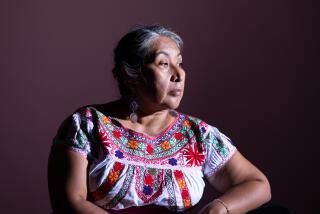Epithet that divides Mexicans is banned by Oxnard school district
Rolando Zaragoza, 21, was 15 years old when he came to the United States, enrolled in an Oxnard school and first heard the term “Oaxaquita.” Little Oaxacan, it means — and it was not used kindly.
“Sometimes I didn’t want to go to school,” he said. “Sometimes I stayed to fight.”
“It kind of seemed that being from Oaxaca was something bad,” said Israel Vasquez, 23, who shared the same mocking, “just the way people use ‘Oaxaquita’ to refer to anyone who is short and has dark skin.”
Years later, indigenous leaders are fighting back against an epithet that lingers among immigrants from Mexico, directed at their own compatriots. Earlier this month the Mixteco/Indigena Community Organizing Project in Oxnard launched the “No me llames Oaxaquita” campaign. “Don’t call me little Oaxacan” aims to persuade local school districts to prohibit the words “Oaxaquita” and “indito” (little Indian) from being used on school property, to form committees to combat bullying and to encourage lessons about indigenous Mexican culture and history.
Indigenous Mexicans have come to the U.S. in increasing numbers in the last two decades. Some estimates now put them at 30% of California’s farmworkers. In Ventura County, there are about 20,000 indigenous Mexicans, most of whom are Mixtec from the states of Oaxaca and Guerrero who work in the strawberry industry, according to local organizers.
Many speak little or no Spanish and are frequently subjected to derision and ridicule from other Mexicans. The treatment follows a legacy of discrimination toward indigenous people in Mexico, said William Perez, a professor of education at Claremont Graduate University who has interviewed and surveyed numerous indigenous Mexican students.
“One of the main themes is the discrimination, bullying, teasing and verbal abuse that they receive from other Mexican immigrant classmates who are not indigenous,” he said. The abuse, which often goes unnoticed or is minimized by teachers and administrators, has left some of the indigenous students too embarrassed to speak their native languages, he said.
Educators and others in the U.S. often don’t recognize diversity within the Mexican community, said Gaspar Rivera-Salgado, a researcher at the UCLA Labor Center who has written extensively about indigenous Mexican migration.
“We forget that it’s a multilingual, multiethnic community,” he said. “We forget about the fact that 62 indigenous languages are spoken in Mexico.”
The organizing project’s campaign, Rivera-Salgado said, “is a really interesting way to confront, very directly, something that the Mexican nation and the Mexican immigrant community sometimes sweeps under the rug, and that’s the prevalence of racism and discrimination that indigenous people have to endure in Mexico and that is reproduced here in the United States.”
Elvia Pacheco, a Mixtec mother who lives in Oxnard, said her U.S.-born son’s middle school teacher poked fun at him for his Oaxacan heritage. Pacheco is from Oaxaca; the boy’s father is from the central state of Guanajuato.
One day her son came home and threatened to kill himself if she made him go to school again.
When she asked what was wrong, “He said, ‘You embarrass me.’”
“It’s the worst thing a mother can hear from her son — to be renounced because of who you are,” she said.
Since then, they have taken classes about Mixtec history and culture and participated in the project’s organizing efforts. It has made a world of difference, she said.
Denis O’Leary, a member of the Oxnard School District’s Board of Trustees, was at an event to launch the campaign.
“I’m very proud of the students and the parents that stood up on this issue,” he said. “We need to now learn from this and do better.”
On Wednesday the school district unanimously passed the resolution originally proposed by the organizing project prohibiting the derogatory terms and creating an anti-bullying committee, O’Leary said.
Though the district had existing policies prohibiting bullying and taunting, “This resolution is going to let teachers know, and administrators know, that this group, that nobody really thought of, has suffered. And we need to pay attention,” he said.
More to Read
Sign up for Essential California
The most important California stories and recommendations in your inbox every morning.
You may occasionally receive promotional content from the Los Angeles Times.











